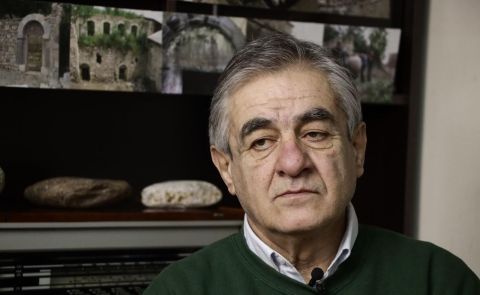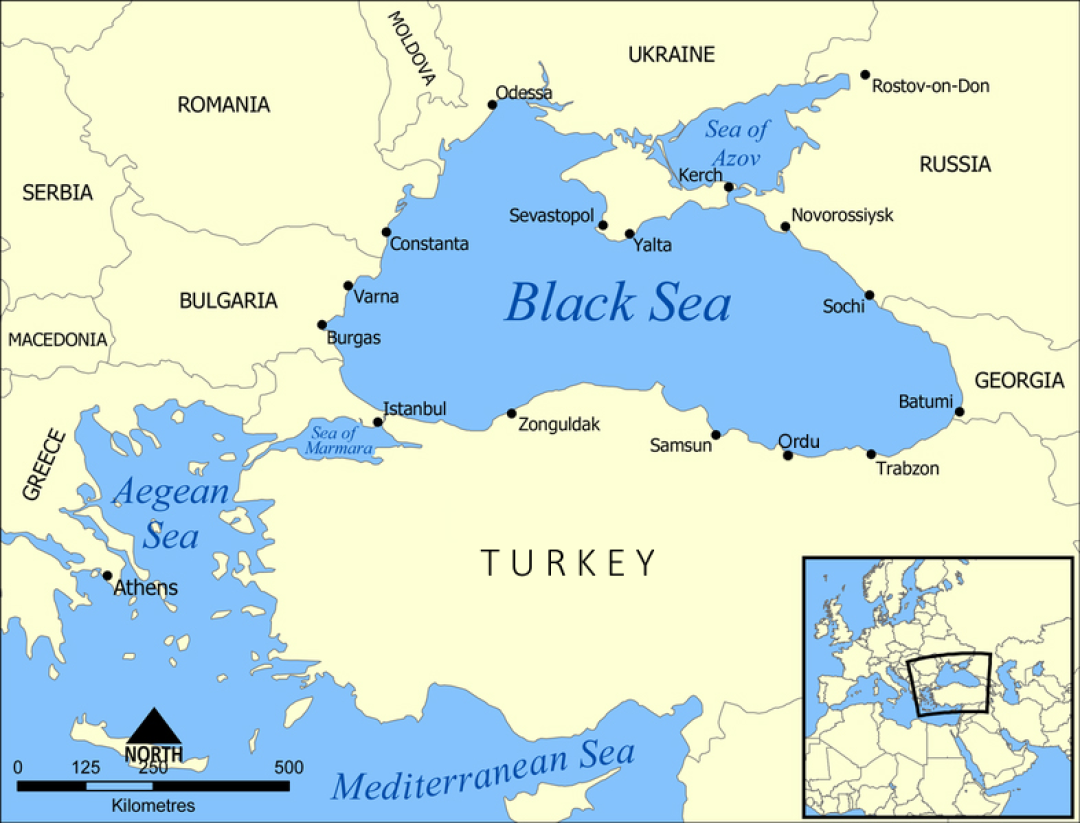
Kornely Kakachia: “A Russian Base in Ochamchire Can Drag Georgia Into the Ukrainian Conflict”

Ochamchire is a small town with a deep-sea port on the Black Sea coast. The city is situated in Abkhazia, a territory that makes up part of the internationally recognised territory of Georgia that has been de facto self-governed since the early 1990s. Therefore, the town is situated within the legal limbo encompassing non-recognized statelets, given that Russia, alongside Nicaragua, Nauru, Venezuela, and Syria, is one of the limited number of states that have recognized the breakaway Republic. Since 2009, Russia has been discussing the establishment of a naval base there, but in January 2024, the idea became a plan. The question is how seriously one should take the commitment to construct a naval base in Abkhazia.
To address this question, CaucasusWatch turned to Kornely Kakachia, a Professor of Political Science at Tbilisi State University and Director of the Georgian Institute of Politics. He specialises in Georgian foreign policy and recently co-authored a policy memo on the state of play for Russia’s Naval Base in Ochamchire.
Some military analysts initially saw the port of Ochamchire as part of a Russian public relations exercise, spending a bit of money in Abkhazia to convince the locals that this territory would not end up “under the bus,” like Nagorno-Karabakh. You have argued that the intention to build a Russian naval base is actually serious. Are there concrete developments that point in this direction?
Because of the war in Ukraine, Russia does not have the luxury to care what Abkhazians think, if there ever was such a consideration. Moscow does not prioritise public opinion in these breakaway regions. The Russian positioning in the region makes part of a bigger picture, as the Kremlin tries to envision how the Black Sea will look after the war.
Of course, NATO has for long been present in the Black Sea, in Turkey, Romania, and Bulgaria. Georgia, too, is a NATO partner and EU candidate country. However, as the EU is gaining ground in the region – Ukraine, Moldova, and Georgia – the question is to what extent Russia can maintain control over the region. The Russian-Turkish duopoly over the Black Sea is undermined. Holding this European ascendance in check, Russia is building up its position in the eastern part of the Black Sea. This positioning is not strictly related to the war in Ukraine but has wider and long-term significance. In sum, Ukraine was successful in pushing the Russian navy out. They are moving to Novorossiysk. Ochamchire could be complementary.
You argue that the advantage of Ochamchire is that it places a Russian naval base beyond the hit zone of medium-range missiles from Ukrainian jet fighters, even F-16s. Is there an estimate of what kind of investment this level of Russian commitment to Ochamchire would require?
Russian open sources suggest Russia has a two-three-year master plan. Numbers are not quoted. This is not merely to deter Georgia’s central authorities from closer engagement to NATO but also to prepare for the future. Russia, in the longer term, needs a safe port to dock its own vessels. Piers and cranes are a considerable investment, but the commitment appears to be solid as Russia needs a safe port for its Navy and merchant vessels. Crimea is obviously not safe anymore. As President Zelenskyy has made clear, this is a legitimate target for Ukraine, increasingly within range of the long-range missile systems of the country.
However, as Ukraine is getting access to more sophisticated systems, including F-16s, Ochamchire is getting within Ukrainian range as well. President Zelensky has said that this would become a target for Ukrainian retaliation. Even if it is under Russian proxy control, this is Georgian territory. Even if the Georgian government is trying to be neutral in conflict and accuses the West of trying to drug it into war, this is a scenario in which Georgia could be drawn into the conflict.
You argue that a naval base in Abkhazia puts Russian forces within striking distance from Poti and Batumi. Given the Russian Caspian Fleet's ability to strike in Syria, is it not true that Georgian ports have always been within Russia's striking range? In sum, what is the additional threat to Georgia?
Good point. However, what Russia can do from the Caspian Sea is very costly. They would prefer not to use this capability. They would prefer other means, not least due to Georgia’s proximity to Russia. Ochamchire is cost-effective from a security perspective. They are already military-present. They are stationed close to Tbilisi and will now also be able to strike major ports and coastal urban centres.
How has the change in the status quo in Karabakh affected Georgian relations with Abkhazia more broadly? Is the prospect of reintegration closer or further away as a result of the war in Ukraine?
This war brought a mixed picture. Georgians understood that a U-turn is possible. Azerbaijan showed that one can change the status quo and obtain control of breakaway territories. Of course, Abkhazia is a different case. Russia remains Abkhazia’s main security guarantor.
In both Abkhazia and in South Ossetia, there have been calls from secessionist leaders for closer integration to Russia, particularly after the unfolding events in Karabakh. These calls are pronounced in Tskhinvali and less so in Sokhumi. There is a looming fear that a deal between Russia and Georgia could make them dispensable, making them a means to an end if Moscow were to strike a deal with Tbilisi, which is not at cards at the moment. The 2008 war turned these territories into a Russian lever on Georgia. Their fear is unfounded. Russia retains the possibility of annexation on the table but does not signal this would be a first choice.
Russia does not want to complicate relations with Tbilisi even more. Moscow realistically prefers the current government of Georgia, which they call pragmatic and see more accommodating to their strategic interest. They want to appease Georgia. But they will not be giving up on the lever they created in 2008.
Does a Russian investment in Ochamchire make a Chinese investment in Anaklia more likely?
Yes. There is a presumption that one of the two consortia bidding for the port of Anaklia is Chinese-controlled, even if it is Singapore-based. It is expected Georgia might favour the Chinese. Strategically, Tbilisi's thinking is that a Chinese investment would be more acceptable to Russia. Moscow would not be happy even with that, but China is a strategic ally. The main point is that EU and US companies should stay out of it. Anaklia would compete with Novorossiysk, but there could also be a military element if Georgia were to allow the docking of NATO vessels. That’s a Russian red line.
Besides, China and Georgia now have a “strategic relationship,” whatever that means. There is also a speculation that the previous consortium, with American engagement, collapsed primarily because of strategic considerations. There is a sense that the Georgian government was trying to accommodate Russian interests.
Proponents have positioned the Middle Corridor as a viable alternative to the Northern Corridor, which connects Belarus and Russia with China. On the other hand, some view it as a link between Central Asian resources and the European Union. Given the current circumstances in the South Caucasus, what do you feel is the significance of the Georgian ports for Russia?
Georgia sees itself as a hub for Sino-European trade, or one of the ports of entry to the Middle Corridor. The vision carries a lot of baggage: the countries in the region need to align technical standards, taxation, and iron out regulatory divergence. After the war, there was an assumption that the Northern Corridor, via Belarus and Russia, would collapse and there would be more opportunity. Traffic has indeed increased. It is not clear whether this peak in traffic is temporary or here to stay, but Georgia continues to see itself as an interconnector, either via the Black Sea or via Turkey. One of the main competitive advantages is that Georgia has a deep and comprehensive free trade agreement with the EU and a free trade agreement with China. This opens up more possibilities. There is, of course, a mutually exclusive decision to be made.
The US sees China as a strategic rival. Historically, Germany has not shared this view, but the tide is changing. The EU is increasingly joining the consensus. One of the nine terms Georgia needs to abide by to remain on track for EU membership is to align with common foreign and security policy frameworks. In sum, it is unclear whether you can be a candidate for EU accession and a strategic Chinese partner. Aligning with the EU's foreign and security policy will be a challenge. Seating on two chairs will become politically more difficult and less sustainable.
Interview conducted by Ilya Roubanis
See Also


Irina Mamulashvili: Electoral Interference is a Playbook, not a Recipe

Giorgi Gakharia: The EU Should Engage Georgia Despite Its Democratic Backsliding

Peace or Capitulation? Shahverdyan on Armenia-Azerbaijan Agreement and the Nagorno-Karabakh Crisis

Ali Mousavi Khalkhali: Iran Will Avoid Conflict in the Caucasus

